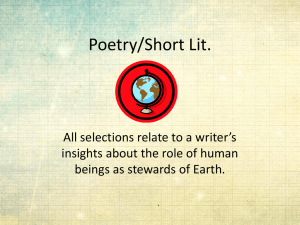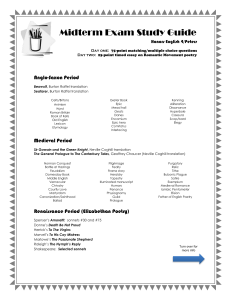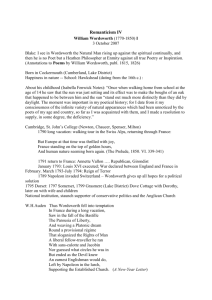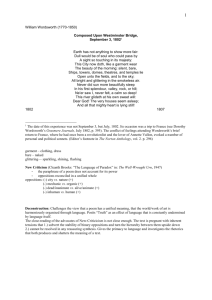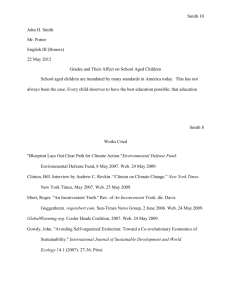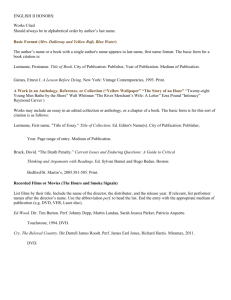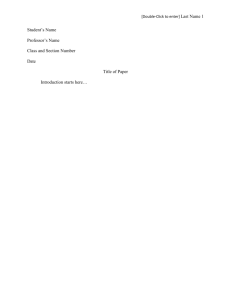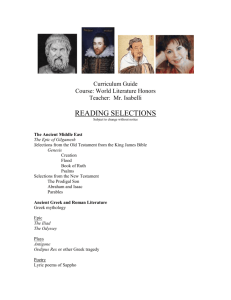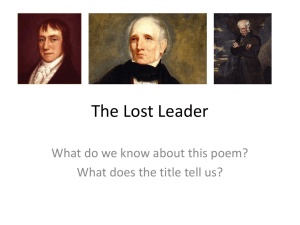Wordsworth's Political Sonnets: Analysis & Context
advertisement
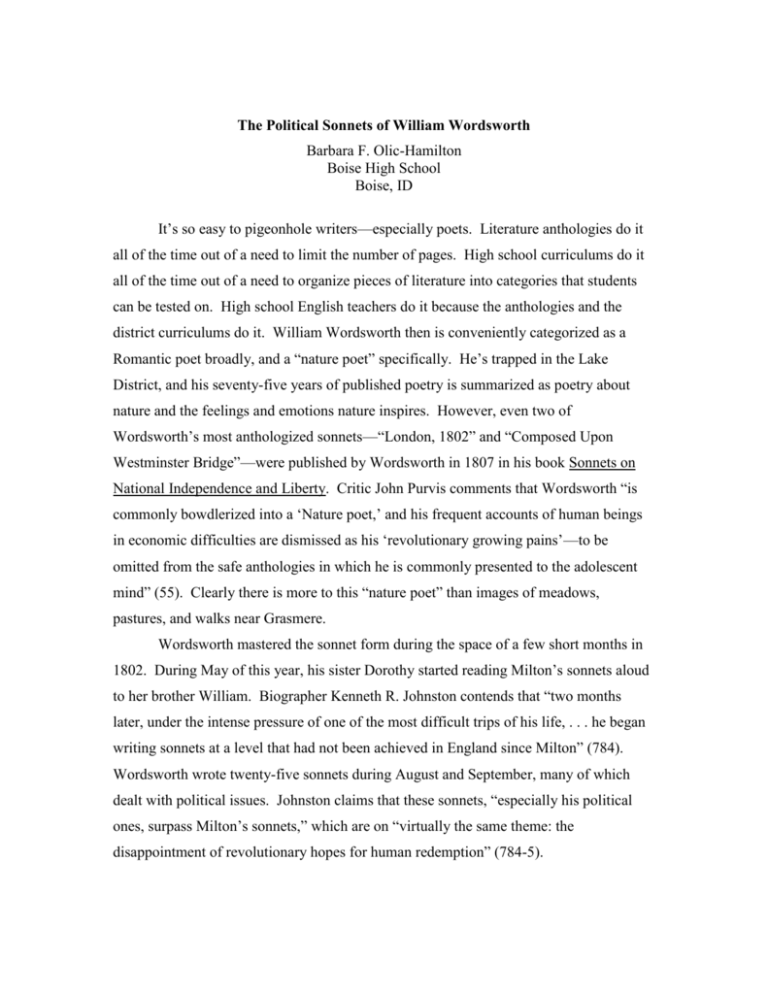
The Political Sonnets of William Wordsworth Barbara F. Olic-Hamilton Boise High School Boise, ID It’s so easy to pigeonhole writers—especially poets. Literature anthologies do it all of the time out of a need to limit the number of pages. High school curriculums do it all of the time out of a need to organize pieces of literature into categories that students can be tested on. High school English teachers do it because the anthologies and the district curriculums do it. William Wordsworth then is conveniently categorized as a Romantic poet broadly, and a “nature poet” specifically. He’s trapped in the Lake District, and his seventy-five years of published poetry is summarized as poetry about nature and the feelings and emotions nature inspires. However, even two of Wordsworth’s most anthologized sonnets—“London, 1802” and “Composed Upon Westminster Bridge”—were published by Wordsworth in 1807 in his book Sonnets on National Independence and Liberty. Critic John Purvis comments that Wordsworth “is commonly bowdlerized into a ‘Nature poet,’ and his frequent accounts of human beings in economic difficulties are dismissed as his ‘revolutionary growing pains’—to be omitted from the safe anthologies in which he is commonly presented to the adolescent mind” (55). Clearly there is more to this “nature poet” than images of meadows, pastures, and walks near Grasmere. Wordsworth mastered the sonnet form during the space of a few short months in 1802. During May of this year, his sister Dorothy started reading Milton’s sonnets aloud to her brother William. Biographer Kenneth R. Johnston contends that “two months later, under the intense pressure of one of the most difficult trips of his life, . . . he began writing sonnets at a level that had not been achieved in England since Milton” (784). Wordsworth wrote twenty-five sonnets during August and September, many of which dealt with political issues. Johnston claims that these sonnets, “especially his political ones, surpass Milton’s sonnets,” which are on “virtually the same theme: the disappointment of revolutionary hopes for human redemption” (784-5). 2 Biographer John Worthen has connected these sonnets with different parts of Wordsworth’s and his sister’s trip to Calais (330). (See attached appendix for text copies of all twenty-five sonnets.) Worthen identifies two sonnets as having been drafted during the trip to France: “Composed Upon Westminster Bridge” and “Composed by the SeaSide, near Calais, August, 1802.” Both of these are political in nature; both present London and England positively. In the first sonnet, London is described as wearing “the beauty of the morning” and as being more beautiful than valleys, rocks and hills. In the second sonnet, Wordsworth calls on the “Fair Star of evening” to be England’s “glorious crest” and emblem. He prays for “blessings” on both the star and England; they share “one hope, one lot, one life, one glory.” Worthen then identifies nine sonnets as having been drafted in Calais (330). Five of them are distinctly political in nature, two are nature poems, and two are lyrical poems about ships Wordsworth observed while walking on the beach. Three of the political sonnets deal with Napoleon Bonaparte and display Wordsworth’s disillusionment with the aftermath of the French Revolution. Two of them chastise England. During his previous trip to France in 1791-1792, Wordsworth was an ardent sympathizer of the Revolution. He counted his friendship with Michel-Arnaud Bacharetie de Beaupuy as the first important male friendship of his life (Johnston 302). General Beaupuy died protecting the Revolution in 1796. Although Wordsworth was involved in a romantic relationship with Annette Vallon, a staunch supporter of the Royalist cause, Beaupuy converted him into a wholehearted supporter of the Revolution. However, after Wordsworth returned to England without the pregnant Annette Vallon, the Reign of Terror began to change his sympathetic support of France. He felt that the ideals of the Revolution were being betrayed by the executions of his French friends such as the Girondins in October and November of 1793. In July 1794, he changed his feelings again because of the death of Robespierre and began to trust the French government again. He felt that the members of England’s Tory government were “vermin” (qtd. in Purvis 23). However, when Napoleon began France’s campaigns of conquest, Wordsworth’s support dissipated. Wordsworth saw Switzerland as the symbol of true Liberty, so Napoleon’s conquest of it in 1798 permanently dissolved his support 3 for France (Purvis 23). Although many English liberals continued to support Napoleon, the invasion of Switzerland confirmed Wordsworth’s suspicions about Napoleon. In 1802, two additional things happened which inflamed Wordsworth and inspired three of the sonnets that he wrote in Calais. First of all, Napoleon declared himself Consul for life on August 4th. Secondly, 16,000 English travelers made their way through Calais en route to Paris to celebrate this declaration and Napoleon’s birthday on August 15th (Worthen 228). Since France had been effectively cut off from London for almost ten years, the English welcomed the peace brought by the Treaty of Amiens and flocked to Paris. Wordsworth was disappointed to discover that Charles James Fox, the Whig leader that Wordsworth admired was part of this visiting mob. Fox came because he was in favor of making peace with Napoleon. “Since [Wordsworth] regarded the French leader as a despot and a menace to free institutions, the only course open was to support that party in England which wanted to continue the war, namely the Tories” (Purvis 25). Wordsworth’s “patriotism was inflamed” (Purvis 25), and he wrote the sonnets that later appeared in Sonnets on National Independence and Liberty. In his sonnet “Calais, August, 1802,” he expressed his disgust with these English visitors. He asks, “What is it that ye go forth to see?” He calls them “men of prostrate mind,” and he tells them: “Shame on you, feeble Heads, to slavery prone!” Wordsworth’s disillusionment with Napoleon and the current results of the ideals of the French Revolution is starkly portrayed in “Composed near Calais, on the Road Leading to Ardres, August 7, 1802” and “Calais, August 15, 1802.” In the first sonnet he contrasts the present state of France with the joy and hope he and his traveling companion Robert Jones felt in France in 1791: Two solitary greetings have I heard, ‘Good morrow, Citizen!’ a hollow word, As if a dead man spake it! This apathetic response continues in the next sonnet: “Calais, August 15, 1802.” While celebrating “young Buonaparte’s natal day . . . Heaven grant that other Cities may be gay! Calais is not.” Each of these three political sonnets has the powerful immediacy that comes from returning to a place that is imbued with strong emotional memories. 4 Wordsworth’s strongest emotional memories from France stemmed from his past relationship with Annette Vallon. In fact, Annette and his daughter Caroline, not Napoleon, were the reason for Wordsworth’s trip to France in 1802. Wordsworth had left France in 1792--before Caroline’s birth--determined to marry Annette someday when he had the financial means and when the political climate had improved. There must have been some contact between them over the next ten years in order to warrant the British government’s surveillance of Wordsworth once war was declared in 1793 (Johnston 335). However, nothing was publicized about the existence of his illegitimate daughter. During the spring of 1802, Wordsworth became betrothed to Mary Hutchinson, a frequent traveling companion on earlier trips with he and Dorothy. However, before he married, he had to conclude his affairs with Annette Vallon and his daughter Caroline. When Dorothy and he left for France in late July, it was “the opposite of a wedding trip”—it was instead “a trip of divorcement” (Johnston 783). There’s been much speculation on what was said or decided with Annette during their month in Calais, other than legally making Annette the guardian of Caroline (Worthen 225). As biographer John Worthen stated: “We have really very little idea of what he and Dorothy did during the four weeks they spent in Calais, and no idea at all what it was like for Wordsworth to be with Annette and Caroline after such a very long time” (225). However, biographers know that he buy a wedding ring for Mary Hutchinson in France. Choosing to buy the ring in France confirmed both “the occasion’s links with the past, and [the] leaving behind his younger self (and the person who had very nearly been his marriage partner)” (Worthen 227). Not only was Dorothy’s usually detailed journal silent on the topic of Annette Vallon, but Wordsworth’s sonnets that he drafted during the trip were “almost entirely political” (Worthen 229). “Biographers sigh at these political sonnets [because] he wrote not about Annette but about the public events which so deeply moved him” (Worthen 229). “Instead of displacing the political into the personal as he usually did, he reversed the process and pushed the personal into the political” (Johnston 784). Wordsworth’s choice of the sonnet over other types of poetry fits his emotional needs at the time. Sonnets, with their closed form and poetic requirements of fourteen lines and a set rhyme scheme, require much of the intellect. They are ill suited for a spontaneous, outpouring of emotions. Sonnets are best suited for expressing ideas and 5 emotions that are reflected in tranquility, which is one of the basic tenets of poetry writing according to Wordsworth and the other Romantic poets. Choosing to focus on topics such as France and England in his sonnets allows Wordsworth to keep his mind off “forbidden ground” (Worthen 229). Therefore, absolutely nothing is known about the relationship that was formed with Annette or with Caroline during August. In his Calais sonnets, Wordsworth has reversed his usual poetic method. What political discussions Annette Vallon and William Wordsworth could have had in Calais! After he left her with an illegitimate child in 1792, she accepted her status as “’Widow William’ and [threw] herself into underground resistance on behalf of God, king, and country” (Johnston 784). Over the years, her family suffered imprisonment for their Royalist views. In Calais when Wordsworth complained about Napoleon’s actions in Switzerland or his naming himself as Consul for life, she would have been justified in telling him, “I told you so”. Johnston described Wordsworth as “a great ventriloquist [who threw] his own voice through other persons” (784). Wordsworth acted as Annette Vallon’s ventriloquist. In these sonnets, Wordsworth echoed her beliefs in the voice of “La Belle France, secure in the knowledge that his critical comments about the sad decline of Liberty in France would not be taken personally by Annette if she should ever chance to read them” (Johnston 784). Therefore, the voice that was critical of France in the political sonnets he wrote in Calais was also the imagined voice of Annette Vallon, the “Widow William.” One of the two nature poems drafted in Calais contains his only mention of his illegitimate daughter. In “It is a Beauteous Evening, Calm and Free,” he describes an evening walk along the beach at Calais as a “holy time” that is as quiet “as a Nun breathless with adoration.” “The gentleness of heaven broods o’er the Sea.” Then he addresses Caroline directly as: “Dear Child! Dear Girl! that walkest with me here.” Ironically, this poem has often been misinterpreted as referring to his legitimate daughter Dorothy who was born in 1804. In addition, seldom is there any mention of Annette Vallon or Caroline in biographies for literature anthologies. The political sensitivity that was heightened by Annette Vallon’s presence can also be seen in the last three sonnets that were drafted in Calais. These political sonnets chastise England instead of France. Two of the sonnets are obviously political poems: 6 “There is a Bondage Worse, Far Worse, to Bear” and “Great Men Have Been Among Us; Hands that Penned.” In the first of these sonnets, Wordsworth starts with a claim that “there is a bondage worse” than that of the French under “a Tyrant’s solitary Thrall.” The worst bondage is for people who belong to a nation wearing “their fetters in their souls.” He questions whether anyone in such a situation could be free “from selfreproach, reproach that he must share with Human nature?” He then identifies the people who are so fettered as the English by his use of the first person plural pronoun: Never be it ours To see the sun how brightly it will shine, And know that noble feelings, manly powers, Instead of gathering strength, must droop and pine. Wordsworth then exhorts the English to develop the “noble feelings” and “manly powers” that they once had. In the second sonnet, “Great Men Have Been Among Us; Hands that Penned,” he echoes this sentiment. Wordsworth listed earlier republican writers from the time of the English Civil War—“Sidney, Marvell, Harrington, Young Vane, and others who called Milton friend.” These men had “hands that penned and tongues that uttered wisdom.” He calls them “moralists [who] could act and comprehend,” and men who “knew how genuine glory was put on.” They even taught the English “how rightfully a nation shone in splendour.” He then noted that France “brought forth no such souls as we had then.” Instead France had “perpetual emptiness,” “unceasing change,” and “a want of books and men.” This sonnet demonstrated Wordsworth inner tension at Calais. He had a low estimate of England, and an even lower estimate of France. Wordsworth unhappily accepted his “need to hang on, if to nothing else, at least to England’s past reputation for liberty and manliness” (Johnston 785). Knowing the political context of these sonnets also reveals a political undertone to a third sonnet written in Calais: “The World is Too Much with Us; Late and Soon.” Although it is often anthologized as a nature poem, it can also be read as a political poem too. This sonnet contains the oft quoted lament that people do not appreciate the beauties and wonder of nature and that we are “out of tune” with nature so that “it moves us not.” It also includes Wordsworth’s emotional yearning to be “a Pagan suckled in a creed 7 outworn” so that the sea could make him “less forlorn.” However, the first four lines of the poem explain what has caused people to be so blind and deaf to the wonder of nature. Wordsworth condemns his fellow Englishmen for being so concerned with “getting and spending” that they “lay waste [their] powers. Since they see little “in Nature “ that they can own or spend, they give their “hearts away, a sordid boon!” This condemnation of greed echoes Wordsworth’s belief that the social evils of his day were caused by England’s development of material elements at the expense of spiritual elements (Cobban 223). This reprimanding tone echoes Wordsworth’s tone in the two political sonnets about England that were just discussed: “There is a Bondage Worse, Far Worse, to Bear” and “Great Men Have Been Among Us; Hands that Penned.” Without knowledge of the political context of this poem, however, anthologies have bowdlerized it into a simplistic statement of the Romantic belief the people need to commune with nature. Worthen further identified eight of the twenty-five sonnets from August and September of 1802 as having been drafted on the return trip to England or in London (330). One of these sonnets—“Dedication”—used the traditional poetic device of addressing the reader directly as “you,” and citing the Greek muse of poetry who was believed to inspire all great poets. “For You” the Muse “wrought” these poems. Only you “can supply the life, the truth, the beauty” to the poems, and the Muse hopes “that for You her verse shall lack not power the ‘meeting soul to pierce!” The other seven sonnets are strongly political, and six of them are patriotic exhortations of England. The only poem that did not deal with England condemned of one of Napoleon’s decrees. Napoleon had recently decreed that all Negroes were expelled from France. In “September 1, 1802,” Wordsworth described a female passenger who was on the same boat from Calais. She was a “white-robed Negro” who was “a lady gay, yet downcast as a woman fearing blame.” He described her using heroic images such as eyes that “retained their tropic fire” and a “burning indepen[dence] of the mind.” He concluded the sonnet with a plea to Heaven to be kind and an admonishment to the Earth to feel “for this afflicted Race.” In the other six poems refer to both France and England in a critical way. In “September, 1802,” Wordsworth portrays his final view of France and how far it has diverged from its revolutionary ideals. The coast of France is near, and he shrinks from it 8 as the boat is “drawn almost into frightful neighbourhood.” He sees the power that is in France, the “mightiness for evil and for good.” He also sees that God only protects people if they are “virtuous and wise.” Strength and power “in themselves are nothing.” His conclusion is that “by the soul only, the Nations shall be great and free.” How a nation gained the type of soul that made it great and free was the subject of several of Wordsworth’s remaining sonnets. In “London, 1802,” he called on Milton to be the virtuous model for England to follow. On a professional level, Wordsworth felt a strong attachment to Milton. He not only used Milton’s sonnets as stylistic models, he also wanted to “devote his pen to the Radical cause” as Milton had done (Len 66). According to scholar Susan Cockcroft, Milton not only wrote sonnets like “On the Late Massacre in Piedmont” that discussed current political events, he also wrote pamphlets against the established church, in defense of the execution of Charles I, and in favor of the free press and divorce on the grounds of incompatibility (16). Like other Romantic poets, Wordsworth identified with Milton for not being afraid to publish such radical beliefs. Critic F.A. Len concluded that by 1802 Wordsworth emerged as “the Miltonic spokesman of England” because of the spirit and form of Wordsworth’s patriotic sonnets (75). Thus it makes perfect sense that Wordsworth addresses Milton in “London, 1802” with the statement that “England hath need of thee” because “she is a fen of stagnant waters” where the “altar, sword, and pen, fireside, [and] the heroic wealth of hall and bower, have forfeited their ancient English dower of inward happiness.” He condemns the English for being “selfish men,” and entreats Milton to “raise us up, return to us again, and give us manners, virtue, freedom, power.” In another political sonnet, Wordsworth uses the same poetic structure as he does in “London, 1802.” He begins “Written in London, September, 1802” by addressing an unnamed “Friend.” Whether this is Milton or a living friend, this sonnet presents the same negative picture of England as “London, 1802.” He sees the heavy focus on materialism by the English middle class and the aristocracy. He bemoans that “our life is only dres[sed] for show” and that “we must run glittering like a brook in the open sunshine, or we are unblest.” He decries that people now put more value on “the wealthiest man” and see no delightful value in “nature or in book.” The English adore “rapine, avarice” and expensive things, instead of “plain living and high thinking.” 9 They’ve lost several things because of this: “the homely beauty of the good old cause,” peace, “[their] fearful innocence, and pure religion breathing household laws.” Contrasting the present faults of England, Wordsworth refers to England’s glorious past in the last three political sonnets: “It is Not to be Thought of That the Flood,” “When I Have Borne in Memory What Has Tamed,” and “England! The Time Is Come When Thou Shouldst Wean.” In the first sonnet, Wordsworth states that it is unbelievable that “the Flood of British freedom, which, to the open sea of the world’s praise” has flowed, should now “perish” and “to evil and to good be lost forever.” He reminds the English that their halls are decorated with medieval armor from “invincible Knights of old.” He exhorts his fellow countrymen by saying: “We must be free or die, who speak the tongue that Shakespeare spake” and who hold the “faith and morals which Milton held.” He ends with a politically incorrect description of England as being “sprung of Earth’s first blood” which gives England “titles manifold” that other countries—like France—do not have. In a similar vein, Wordsworth exhorts his native country to “wean [its] heart from its emasculating food” in “England! The Time Is Come When Thou Shouldst Wean.” Wordsworth states that England might have seen “better harvest. . . but for thy trespasses.” He caustically remarks that “if for Greece, Egypt, India, Africa, aught good were destined, thou wouldst step between.” “All nations in this charge agree;” however, “thine Enemy”—France--is even worse than England because it is “more ignorant in love and hate.” Therefore, Wordsworth sees “the wise pray[ing] for [England], though the freight of [England’s] offences be a heavy weight.” He ends the sonnet with “Oh grief that Earth’s best hopes rest all with Thee!” This ambivalent concluding line may not sound patriotic compared to the rhetoric of American patriotic poetry after September 11th, but it clearly places his loyalty with England instead of France. Critic Stephen Gill explains it this way: “As all effective moral censors do, Wordsworth [simplifies] the past in order to alert the present to its degeneration and to provide a positive image of the better way” (209). In “When I Have Borne in Memory What Has Tamed,” his last political sonnet, Wordsworth continues his role of “effective moral censor” (Gill 209). He presents himself as a student of history who has seen how the “ennobling thoughts” of “Great 10 Nations” have departed “when men change swords for ledgers, and desert the student’s bower for gold.” These observations make him fear for his country’s well being in light of the way that the Napoleonic Wars has stimulated the economy and the Industrial Revolution itself (Purvis 49). Although he wouldn’t have used historian Pat Hudson’s terms, Wordsworth seems to have noticed and been concerned by the emergence of the “fiscal-military state” in England (52). He would have felt that it was an important, negative transformation of the English government. However, Wordsworth did not lose all hope in his country. When he thinks of what England truly is and has been in the past, he says he’s “ashamed” of his fears. He prizes England and finds in her “a bulwark for the cause of men.” He explains his past wavering of affection—which implies his past conflict over whether or not to support the French Revolution and France—as the natural “movements of [a poet’s] mind [which] felt for [England] as a lover or a child.” Since the ardent passion that lovers and children feel still allow them to be critical of the objects of their affection, Wordsworth feels his poetic patriotism should involve both passion and criticism. Once again, he is the “moral censor” of England—the land of Shakespeare and Milton—the land that he loves. John Worthen identifies six other sonnets that were drafted sometime during August or September 1802. None of them are political. Three of them are titled “To Sleep” and feel like poetic exercises on the topic of sleep or rather insomnia. It could be conjectured that Wordsworth’s interest in insomnia suggests the emotional turmoil of his reunion with Annette Vallon and his return to France. A fourth sonnet, “Methought I Saw the Footsteps of a Throne,” seems to recount the allegorical details of a vivid dream. After walking through “mists and vapours,” Wordsworth sees a king on a throne. The king is Death himself. Wordsworth continues through the mist and finds a “mossy cave” where a beautiful woman sleeps alone “with her face up to heaven.” She is to him “a lovely Beauty in a summer grave.” It could be speculated that Annette Vallon is this “lovely Beauty,” but that would require more research. The fifth poem was dedicated “To the Memory of Raisley Calvert” who had died in 1795 and left a legacy to Wordsworth. The legacy gave Wordsworth the means to continue writing full-time. In this sonnet, Wordsworth is glad that any of his past verse 11 that is “pure, or good, or great” will “be [Calvert’s] praise.” The sonnet formally thanks Raisley Calvert for giving Wordsworth “many years of early liberty” with the money he left to him. The last poem, “Beloved Vale!” I said, “When I Shall Con,” seems to express his melancholy when he returned to London after Calais. He is assailed “by doubts and thousand petty fancies,” and he is so depressed that even the brooks seemed “narrow” and “the fields so small.” Biographer Stephen Gill describes Wordsworth’s return to London and his visit to writer Charles Lamb. Lamb guides him on a walk down the streets of London, “past the jugglers, tumblers, musicians, ventriloquists, hucksters, and catch-penny freaks such as ‘The horse of knowledge, and the learned pig” (210). Lamb hopes that Wordsworth can enjoy this varied array of people and activities. This experience seems to be referred to at the end of this sonnet when Wordsworth states: “A juggler’s balls old Time about him tossed; I looked, I stared, I smiled, I laughed; and all the weight of sadness was in wonder lost.” It seems as if Lamb’s guided walk succeeded in lifting Wordsworth’s depression at least momentarily. After researching and analyzing this small part of the huge body of poetry that William Wordsworth wrote during his lifetime, it was easy to see that he is not simply a “nature poet.” During his life, he wrote many poems that he hoped would have a positive effect on public policy, sometimes by presenting the lives of people of the lower classes or outcasts, sometimes by being the “moral censor” of an England that he loved. However, it was his political poems that “most nineteenth-century readers chose to ignore” (Purvis 63). They were omitted from Victorian anthologies in favor of his nature poems. These Victorian anthologies spawned future literature anthologies that continued to simplify Wordsworth’s poetic range to brooks, vales, lakes, and violets. Contemporary anthologies need to bypass the Victorian collections and return to the sonnets Wordsworth wrote two hundred years ago. Among these twenty-five sonnets of August and September of 1802, editors will find examples of a patriotism tempered with needed censure. They will find a patriotism which cries that people “must be free or die, who speak the tongue that Shakespeare spake” at the same time as it warns that “ennobling thoughts depart when men change swords for ledgers, and desert the student’s bower for gold.” It is time to stop reprinting only William Wordsworth’s nature poems. 12 Freedom in any nation demands both praise and “moral censor” no matter how uncomfortable it makes people. Sonnets Composed During August and September of 1802 by William Wordsworth Drafted During the Trip to Calais: Composed Upon Westminster Bridge Earth has not anything to show more fair: Dull would he be of soul who could pass by A sigh so touching in its majesty: This City now doth, like a garment, wear The beauty of the morning; silent, bare, Ships, towers, domes, theatres, and temples lie Open unto the fields, and to the sky; All bright and glittering in the smokeless air. Never did sun more beautifully steep In his first splendour, valley, rock, or hill; Ne’er saw I, never felt, a calm so deep! The river glideth at his own sweet will: Dear God! the very houses seem asleep; And all that mighty heart is lying still! Composed by the Sea-Side, near Calais, August, 1802 Fair Star of evening, Splendour of the west, Star of my Country! – on the horizon’s brink Thou hangest, stooping, as might seem, to sink On England’s bosom; yet well pleased to rest, Meanwhile, and be to her a glorious crest Conspicuous to the Nations. Thou, I think, Shouldst be my Country’s emblem; and shouldst wink, Bright Star! with laughter on her banners, drest In thy fresh beauty. There! that dusky spot Beneath thee, that is England; there she lies. Blessings be on you both! one hope, one lot, One life, one glory! – I, with many a fear For my dear Country, many heartfelt sighs, Among men who do not love her, linger here. 13 Drafted in Calais: Calais, August, 1802 Is it a read that’s shaken by the wind, Or what is it that ye go forth to see? Lords, lawyers, statesmen, squires of low degree, Men known, and men unknown, sick, lame, and blind, Post forward all, like creatures of one kind, With first-fruit offerings crowd to bend the knee In France, before the new-born Majesty. ‘Tis ever thus. Ye men of prostrate mind, A seemly reverence may be paid to power; But that’s a loyal virtue, never sown In haste, nor springing with a transient shower: When truth, when sense, when liberty were flown, What hardship had it been to wait an hour? Shame on you, feeble Heads, to slavery prone! Composed near Calais, on the Road Leading to Ardres, August 7, 1802 Jones! as from Calais southward you and I Went pacing side by side, this public Way Streamed with the pomp of a too-credulous day, When faith was pledged to new-born Liberty: A homeless sound of joy was in the sky: From hour to hour the antiquated Earth Beat like the heart of Man: songs, garlands, mirth, Banners, and happy faces, far and nigh! And now, sole register that these things were, Two solitary greetings have I heard, ‘Good morrow, Citizen!’ a hollow word, As if a dead man spake it! Yet despair Touches me not, though pensive as a bird Whose vernal coverts winter hath laid bare. Calais, August 15, 1802 Festivals have I seen that were not names: This is young Buonaparte’s natal day, And his is henceforth an established sway— Consul for life. With worship France proclaims Her approbation, and with pomps and games. Heaven grant that other Cities may be gay! Calais is not: and I have bent my way 14 To the sea-coast, noting that each man frames His business as he likes. Far other show My youth here witnessed, in a prouder time; The senselessness of joy was then sublime! Happy is he, who, caring not for Pope, Consul, or King, can sound himself to know The destiny of Man, and live in hope. It is a Beauteous Evening, Calm and Free It is a beauteous evening, calm and free, The holy time is quiet as a Nun Breathless with adoration; the broad sun Is sinking down in its tranquility; The gentleness of heaven broods o’er the Sea; Listen! the might Being is awake, And doth with his eternal motion make A sound like thunder—everlastingly. Dear Child! dear Girl! that walkest with me here, If thou appear untouched by solemn thought, Thy nature is not therefore less divine: Thou liest in Abraham’s bosom all the year; And worshipp’st at the Temple’s inner shrine, God being with thee when we know it not. Probably Drafted While in Calais: There is a Bondage Worse, Far Worse, to Bear There is bondage worse, far worse, to bear Than his who breathes, by roof, and floor, and wall, Pent in, a Tyrant’s solitary Thrall: ‘Tis his who walks about in the open air, One of a Nation who, henceforth, must wear Their fetters in their souls. For who could be, Who, even the best, in such condition, free From self-reproach, reproach that he must share With Human-nature? Never be it ours To see the sun how brightly it will shine, And know that noble feelings, manly powers, Instead of gathering strength, must droop and pine; And earth with all her pleasant fruits and flowers Fade, and participate in man’s decline. Where Lies the Land to Which Yon Ship Must Go? 15 Where lies the Land to which yon Ship must go? Fresh as a lark mounting at break of day,’ Festively she puts forth in trim array; Is she for tropic suns, or polar snow? What boots the inquiry? –Neither friend nor foe She cares for; let her travel where she may, She finds familiar names, a beaten way Ever before her, and a wind to blow. Yet still I ask, what haven is her mark? And, almost as it was when ships were rare, (From time to time, like Pilgrims, here and there Crossing the waters) doubt, and something dark, Of the old Sea some reverential fear, Is with me at thy farewell, joyous Bark! With Ships the Sea Was Sprinkled Far and Nigh With ships the sea was sprinkled far and nigh Like stars in heaven, and joyously it showed; Some lying fast at anchor in the road, Some veering up and down, one knew not why. A goodly Vessel did I then espy Come like a giant from a haven broad; And lustily along the bay she strode, Her tackling rich, and of apparel high. This Ship was naught to me, nor I to her, Yet I pursued her with a Lover’s look; This Ship to all the rest did I prefer: When will she turn, and whither? She will brook No tarrying; where She comes the winds must stir: On went She, and due north her journey took. The World is Too Much with Us; Late and Soon The world is too much with us; late and soon Getting and spending, we lay waste our powers: Little we see in Nature that is ours; We have given our hearts away, a sordid boon! This Sea that bares her bosom to the moon; The winds that will be howling at all hours, And are up-gathered now like sleeping flowers; For this, for everything, we are out of tune; It moves us not. —Great God! I’d rather be A Pagan suckled in a creed outworn; So might I, standing on this pleasant lea, Have glimpses that would make me less forlorn; 16 Have sight of Proteus rising from the sea; Or hear old Triton blow his wreathed horn. Great Men Have Been Among Us; Hands that Penned Great men have been among us; hands that penned And tongues that uttered wisdom—better none: The later Sidney, Marvell, Harrington, Young Vane, and others who called Milton friend. These moralists could act and comprehend: They knew how genuine glory was put on; Taught us how rightfully a nation shone In splendour: what strength was, that would not bend But in magnanimous meekness. France, ‘tis strange, Hath brought forth no such souls as we had then. Perpetual emptiness! unceasing change! No single volume paramount, no code, No master spirit, no determined road; But equally a want of books and men! Drafted on the Return Trip to England from Calais: September 1, 1802 We had a female Passenger who came From Calais with us, spotless in array,-A white-robed Negro, like a lady gay, Yet downcast as a woman fearing blame; Meek, destitute, as seemed of hope or aim She sate, from notice turning not away, But on all proffered intercourse did lay A weight of languid speech, or to the same No sign of answer made by word or face: Yet still her eyes retained their tropic fire, That, burning independent of the mind, Joined with the lustre of her rich attire To mock the Outcast—O ye Heavens, be kind! And feel, thou Earth, for this afflicted Race! Dedication (Sent with These Poems, in Ms., to --) Dear Fellow-travellers! think not that the Muse, To You presenting these memorial Lays, Can hope the general eye thereon would gaze, 17 As on a mirror that gives back the hues Of living Nature; no—though free to choose The greenest bowers, the most inviting ways, The fairest landscapes and the brightest days— Her skill she tried with less ambitious views. For You she wrought: Ye only can supply The life, the truth, the beauty: she confides In that enjoyment which with You abides, Trusts to your love and vivid memory; Thus far contented, that for You her verse Shall lack not power the ‘meeting soul to pierce!” September, 1802. Near Dover Inland, within a hollow vale, I stood; And saw, while sea was calm and air was clear, The coast of France—the coast of France how near! Drawn almost into frightful neighbourhood, I shrunk; for verily the barrier flood Was like a lake, or river bright and fair, A span of waters; yet what power is there! What mightiness for evil and for good! Even so doth God protect us if we be Virtuous and wise. Winds blow, and waters roll, Strength to the brave, and Power, and Deity; yet in themselves are nothing! One decree Spake laws to them, and said that by the soul Only, the Nations shall be great and free. Written in London on the Return Trip from Calais: London, 1802 Milton! thou shouldst be living at this hour: England hath need of thee: she is a fen Of stagnant waters: altar, sword, and pen, Fireside, the heroic wealth of hall and bower, Have forfeited their ancient English dower Of inward happiness. We are selfish men; Oh! raise us up, return to us again; And give us manners, virtue, freedom, power. Thy soul was like a Star, and dwelt apart: Thou hadst a voice whose sound was like the sea: Pure as the naked heavens, majestic, free, So didst thou travel on life’s common way, 18 In cheerful godliness; and yet thy heart The lowliest duties on herself did lay. Written in London, September, 1802 O Friend! I know not which way I must look For comfort, being, as I am, opprest, To think that now our life is only drest For show; mean handy-work of craftsman, cook, Or groom! – We must run glittering like a brook In the open sunshine, or we are unblest: The wealthiest man among us is the best: No grandeur now in nature or in book Delights us. Rapine, avarice, expense, This is idolatry; and these we adore: Plain living and high thinking are no more: The homely beauty of the good old cause Is gone; our peace, our fearful innocence, And pure religion breathing household laws. May have been drafted in London on the Return from Calais: It is Not to be Thought of That the Flood It is not to be thought of that the Flood Of British freedom, which, to the open sea Of the world’s praise, from dark antiquity Hath flowed, ‘with pomp of waters, unwithstood,’ Roused though it be full often to a mood Which spurns the check of salutary bands, That this most famous Stream in bogs and sands Should perish; and to evil and to good Be lost for ever. In our halls is hung Armoury of the invincible Knights of old: We must be free or die, who speak the tongue That Shakespeare spake; the faith and morals hold Which Milton held.—In everything we are sprung Of Earth’s first blood, have titles manifold. When I Have Borne in Memory What Has Tamed When I have borne in memory what has tamed Great Nations, how ennobling thoughts depart When men change swords for ledgers, and desert The student’s bower for gold, some fears unnamed 19 I had, my Country! –am I to be blamed? Now, when I think of thee, and what thou art, Verily, in the bottom of my heart, Of those unfilial fears I am ashamed. For dearly must we prize thee; we who find In thee a bulwark for the cause of men; And I by my affection was beguiled: What wonder if a Poet now and then, Among the many movements of his mind, Felt for thee as a lover or a child! England! The Time Is Come When Thou Shouldst Wean England! the time is come when thou shouldst wean Thy heart from its emasculating food; The truth should now be better understood; Old things have been unsettled; we have seen Fair seed-time, better harvest might have been But for thy trespasses; and, at this day, If for Greece, Egypt, India, Africa, Aught good were destined, thou wouldst step between. England! all nations in this charge agree: But worse, more ignorant in love and hate, Far---far more abject is thine Enemy: Therefore the wise pray for thee, though the freight Of thy offences be a heavy weight: Oh grief that Earth’s best hopes rest all with Thee! Drafted Sometime During August or September, 1802: To Sleep O gentle Sleep! do they belong to thee, These twinklings of oblivion! Thou dost love To sit in meekness, like the brooding Dove, A captive never wishing to be free. This tiresome night, O Sleep! thou art to me A Fly, that up and down himself doth shove Upon a fretful rivulet, now above, Now on the water vexed with mockery. I have no pain that calls for patience, no; Hence am I cross and peevish as a child: Am pleased by fits to have thee for my foe, Yet ever willing to be reconciled: O gentle Creature! do not use me so, But once and deeply let me be beguiled. 20 To Sleep A flock of sheep that leisurely pass by, One after one; the sound of rain, and bees Murmuring; the fall of rivers, winds and seas, Smooth fields, white sheets of water, and pure sky; I have thought of all by turns and yet do lie Sleepless! and soon the small birds’ melodies Must hear, first uttered from my orchard trees; And the first cuckoo’s melancholy cry. Even thus last night, and two nights more, I lay, And could not win thee, Sleep! by any stealth: So do not let me wear tonight away: Without Thee what is all the morning’s wealth? Come, blessed barrier between day and day, Dear mother of fresh thoughts and joyous health! To Sleep Fond words have oft been spoken to thee, Sleep! And thou hast had thy store of tenderest names; The very sweetest, Fancy culls or frames, When thankfulness of heart is strong and deep! Dear Bosom-child we call thee, that doest steep In rich reward all suffering; Balm that tames All anguish; Saint that evil thoughts and aims Takest away, and into souls dost creep, Like to a breeze from heaven. Shall I alone, I surely not a man ungently made, Call thee worst Tyrant by which Flesh is crost? Perverse, self-willed to own and to disown, Mere slave of them who never for thee prayed, Still last to come where thou art wanted most! “Beloved Vale!” I said, “When I Shall Con “Beloved Vale!” I said, “when I shall con Those many records of my childish years, Remembrance of myself and of my peers Will press me down: to think of what is gone Will be an awful thought, if life have one.” But when into the Vale I came, no fears Distressed me; from mine eyes escaped no tears; Deep thought, or dream remembrance, had I none. By doubts and thousand petty fancies crost 21 I stood, of simple shame the blushing Thrall; So narrow seemed the brooks, the fields so small! A Juggler’s balls old Time about him tossed; I looked, I stared, I smiled, I laughed; and all The weight of sadness was in wonder lost. Methought I Saw the Footsteps of a Throne Methought I saw the footsteps of a throne Which mists and vapours from mine eyes did shroud— Nor view of who might sit thereon allowed; But all the steps and ground about were stown With sights the ruefullest that flesh and bone Ever put on; a miserable crowd, Sick, hale, old, young, who cried before that cloud, “Thou art our king, O Death! to thee we groan.” Those steps I clomb; the mists before me gave Smooth way; and I beheld the face of one Sleeping alone within a mossy cave, With her face up to heaven; that seemed to have Pleasing remembrance of a thought foregone; A lovely Beauty in a summer grave! To the Memory of Raisley Calvert Calvert! it must not be unheard by them Who may respect my name, that I to thee Owed many years of early liberty. This care was thine when sickness did condemn Thy youth to hopeless wasting, root and stem— That I, if frugal and severe, might stray Where’er I liked; and finally array My temples with the Muse’s diadem. Hence, if in freedom I have loved the truth; If there be aught of pure, or good, or great, In my past verse; or shall be, in the lays Of higher mood, which not I meditate;-It gladdens me, O worthy, short-lived, Youth! To think how much of this will be thy praise. 22 Bibliography Cobban, Alfred. Edmund Burke and the Revolt Against the Eighteenth Century; A Study of the Political and Social Thinking of Burke, Wordsworth, Coleridge and Southey. London: George Allen & Unwin Ltd., 1960. Cockcroft, Susan. Living Literature: Contexts. London: Hodder & Stoughton, 2002. Davies, Hunter. William Wordsworth. Phoenix Mill, England: Sutton Publishing, 1980. Gill, Stephen. William Wordsworth: A Life. Oxford: Oxford University Press, 1989. Hudson, Pat. The Industrial Revolution. London: Edward Arnold, 1992. Johnston, Kenneth R. The Hidden Wordsworth: Poet, Lover, Rebel, Spy. New York: W.W. Norton & Company, 1998. Len, F. A. Voices in the Wilderness: from Poetry to Prophecy in Britain. London: Brentham Press, 1975. Purvis, John. A Preface to Wordsworth. London: Longman, 1990. Wordsworth, William. The Poems. Volumes I & II. Ed. John O. Hayden. London: Penguin Books, 1977. Worthen, John. The Gang: Coleridge, the Hutchinsons and the Wordsworths in 1802. New Haven: Yale University, 2001.
